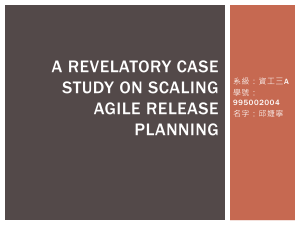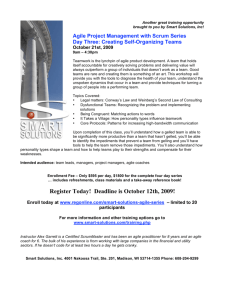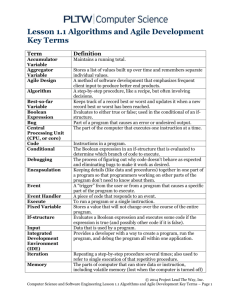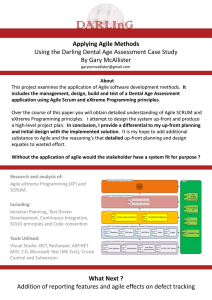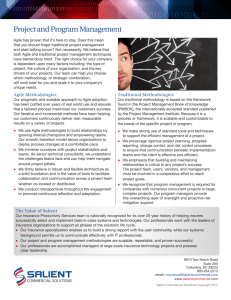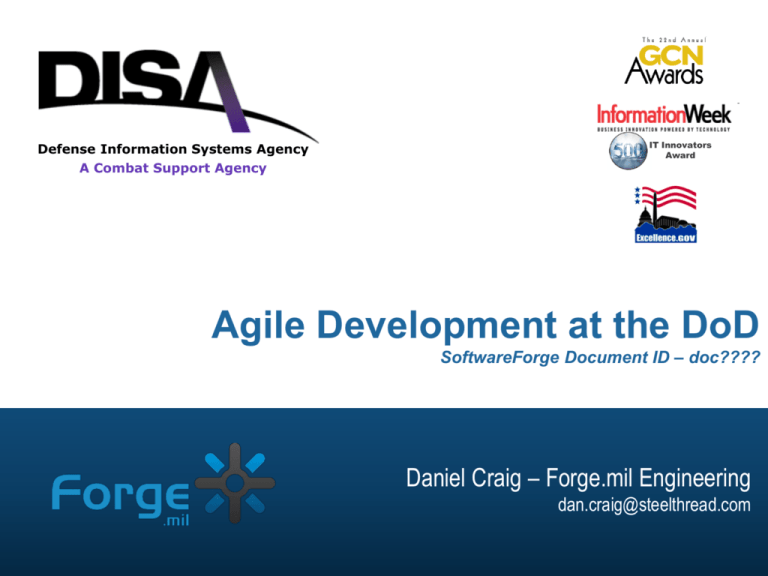
Defense Information Systems Agency
A Combat Support Agency
IT Innovators
Award
Agile Development at the DoD
SoftwareForge Document ID – doc????
Daniel Craig – Forge.mil Engineering
dan.craig@steelthread.com
Agenda
• The State of Software Development
• Agile as a Solution
• Forge.mil Tailored Agile Practices
• Questions & Answers
2
The New Mission
“Software code has become central to how the warfighter is able to conduct missions… DoD must
pursue an active strategy to manage its software
knowledge base and foster an internal culture of
open interfaces, modularity, collaboration, and
reuse.”
- Open Technology Development Roadmap Plan (April 2006)
- Commissioned by Sue Payton, Asst. Sec for Air Force Acquisition
3
Changing Policy & Guidance
HR 2647, National Defense Authorization Act for Fiscal Year 2010,
Sec. 804.
“The Secretary of Defense shall develop and implement a new acquisition process
for information technology systems. The acquisition process developed and
implemented pursuant to this subsection shall, to the extent determined
appropriate by the Secretary —
. . . be based on the recommendations in chapter 6 of the March 2009 report of the
Defense Science Board Task Force on Department of Defense Policies and
Procedures for the Acquisition of Information Technology; and
. . . be designed to include —
1. early and continual involvement of the user;
2. multiple, rapidly executed increments or releases of capability;
3. early, successive prototyping to support an evolutionary approach; and
4. a modular, open-systems approach.
4
Are We Involving The End User?
Rates of Feature Usage in Software Projects:
Always or Often Used
20%
Rarely or Never Used
64%
Standish Group Study
5
Are We Delivering Quickly?
Conventional projects take too long
and often miss the mark
Lean (agile) methods link developers
and users to hit the mark quickly
6
Are We Delivering Incrementally?
Successful Delivery by Project Budget
Standish Group Study
7
Are We Delivering At All?
Delivery on U.S. Software Projects
Standish Group Study
8
Agile As A Possible Solution
Agile principles include:
•
•
•
•
Focus on Customer Value – Align project,
product and team visions to deliver better
product quality – faster and cheaper.
Small Batches - Create a flow of value to
customers by “chunking” feature delivery
into small increments.
Small, Integrated Teams - Intense
collaboration via face-to-face
communication, collocation, etc; diversified
roles on integrated, self-organizing, selfdisciplined teams.
Small, Continuous Improvements –
Teams reflect, learn and adapt to change;
work informs the plan.
Delivering Customer Value with Agile
Project Management
The right product, at the right time,
for the right price.
•
Higher Quality: “Designed-to-fit”
product with flexibility to change.
•
Increased Throughput: Iterative and
incremental project and product
“chunks” with earlier value delivery.
•
Reduced Waste: Lean, efficient
processes with lower costs and
higher productivity.
9
Agile = Family of Methodologies
• Extreme Programming
• Lean Software
Development
• Feature Driven
Development
• Dynamic Systems
Development Method
• Agile Unified Process
• SCRUM
Forge.mil employs a SCRUM / XP
hybrid methodology
10
Agile = Early Value
Traditional Process
Agile Process
Do we have half
a solution yet?
Analysis
20% done
(100% usable!)
Analysis
Design
Design
Coding
Testing
Time
Coding
Testing
Time
11
Waterfall Requires Perfect Vision
Waterfall calls for a fully formed idea up
front.
And, doing it on time requires dead
accurate estimation.
1
2
3
4
5
12
© Jeff Patton, all rights reserved, www.AgileProductDesign.com
12
Agile Expects Vision Shift
…builds a rough version, validates it, then slowly builds up
quality
A more iterative allows you to move
from vague idea to realization making
course corrections as you go….stop
when diminishing returns are
encountered!
1
2
3
4
5
13
© Jeff Patton, all rights reserved, www.AgileProductDesign.com
13
Short Iterations, Small Releases
14
Cross Functional Teams
15
Reliance on Automation
Informs
Manager
Commit
Developers
Watches
Uses
Version Control
Build Integration
(SVN, CVS, GIT)
(Jenkins, Maven)
(Ant, Puppet, Bash,
PowerShell)
Automated Push
Test 1
(Automated Regression Tests)
Test
Nightly Pull
Tester
Build Scripts
Test 2
Compile/Tag Source
Run Unit Tests
Run Functional Tests
Run Test Coverage
Static Code Analysis
Build Database
(Manual & Migration Tests)
Inspect
On-Demand Pull
Stakeholder
Sandbox
16
The “Agile Bet”
THE AGILE BET
If we can make changes cheaply enough, the
cost savings from quicker feedback and
increased learning outweigh the costs of
overhead and rework.
17
Considering Agile at DoD
How do we write an agile SOW?
Can we write a cost or affordability
rationale under agile?
Do we need an agile coach?
What’s the effect on CONOP?
Is it possible to co-locate?
How do we get
access to end
users for feedback?
Will testers be allowed to work
closely with development?
18
Agile Best Practices
Forge.mil Hybrid Agile Methodology
SCRUM
(Management Framework)
“Soft” Best Practices
• Requirements Backlog
• Sprint Kickoff
• Daily Standup
• Burn-down Chart
• User Acceptance Test
Team Members
• Program Management
• Information Assurance
• Operations
• Business Office
XP
(Development Methodology)
“Hard” Best Practices
• Planning Game
• User Stories
• Test Driven Development
• Continuous Integration
• Continuous Testing
Team Members
• Project Management
• Development
• QA - Test
19
Procurement / Acquisition
– Procurement
•
•
•
•
Not Aware of any Template Agile RFP or SOW Language
Identify required reviews
Define type, format and content of documentation to fit agile process
Identify constraints from outside teams such as IA or IOP
– Staffing
•
•
•
•
•
•
Team composition and interaction changes
Co-location of teams or invest in online meeting and collaboration tools
Rewrite roles and responsibilities of team members
Consider the use of an agile coach on the team
Pre-award training
Unmanageable
20
Planning / “Envision”
– Best Practices
• System Metaphor (xp)
• The Planning Game (xp)
• Product Backlog (scrum)
– Forge.mil Tweaks
• Quarterly Release Meetings (added!)
• Flag Features with Security Implications (added!)
• Unmanageable
21
Development / Test
– Best Practices
•
•
•
•
•
•
Burn down (scrum)
Sprint Backlog (scrum)
Sprint Planning (scrum)
Daily Standup (scrum/xp)
Sprint Review (scrum)
Sprint Retrospective (scrum)
•
•
•
•
•
•
Simple Design (xp)
Continuous Testing (xp)
Refactoring (xp)
Pair Programming (xp)
Collective Code Ownership (xp)
40 Hour Work Week (xp)
– Forge.mil Tweaks
•
•
•
•
Embed IA Representative (added!)
Continuous Integration – leverage for security scans (in progress)
Onsite Customer – invest in collaborative tools (DCO, Forge.mil, survey)
Coding Standards – leverage CI plug-ins
22
Integration / Release
– Best Practices
• Small Releases (xp)
• Frequent Releases (xp)
– Forge.mil Tweaks
• Fully Automate Application Releases (added!)
• Fully Automate Environment Configuration – O/S, DB, STIG (added!)
• Maintain Release Management Dashboard (in progress)
23
Questions
24
Contact Info
Email us at community@forge.mil
Follow us on Twitter @ForgeMil
Join the Forge.mil Group on milBook
Sign up for Forge.mil updates at
http://www.disa.mil/forge/
25


